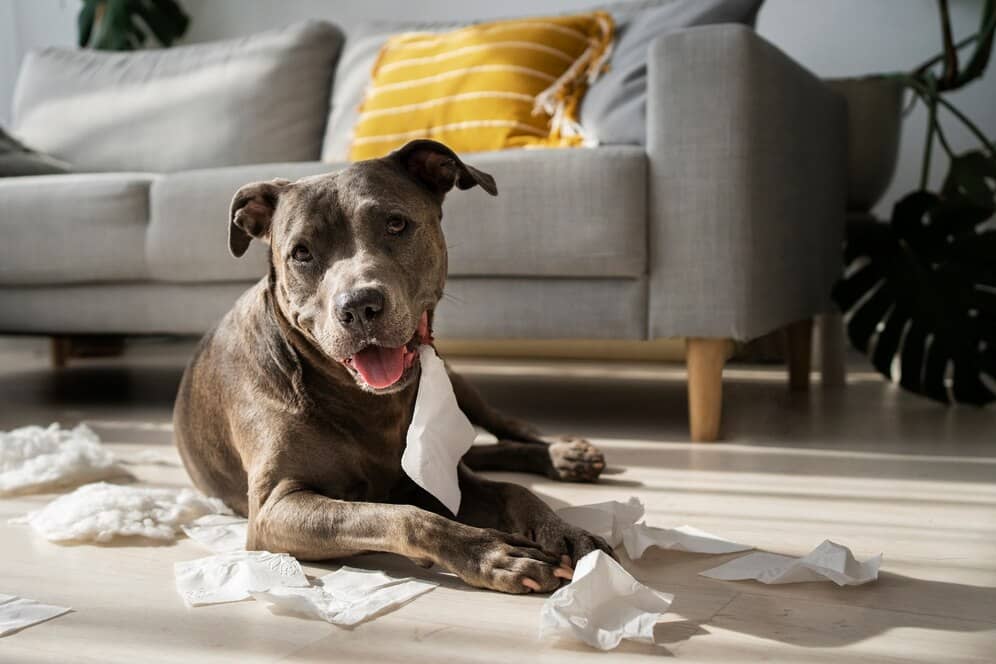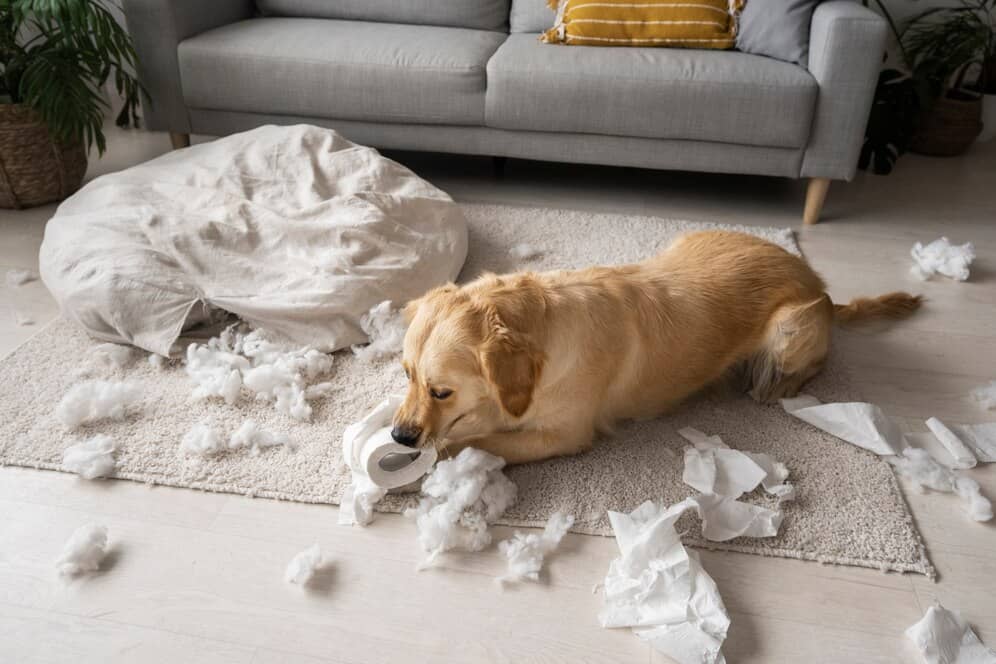
Why does my dog scratch the carpet? This question plagues many pet owners, leading them down a rabbit hole of internet searches and speculative conversations at the dog park. Yet, the answers are rarely straightforward. Dogs, like humans, are complex beings with a wide array of behaviors driven by equally diverse motivations. To truly understand this behavior, we must delve deeper than the surface scratches on your living room carpet.
Learn why dogs scratch carpets
- Dog scratches carpet for comfort, attention, territory marking, anxiety, boredom, or medical issues.
- Ways to stop the behavior include redirecting, providing exercise, addressing anxiety, ensuring comfort, trimming nails, and seeking vet help.
1. Your Dog Is Trying to Get Comfortable

Remember the last time you fidgeted in an office chair trying to get comfortable? Your dog’s carpet scratching might be the canine equivalent. Natural instincts drive dogs to make their resting area cozy and secure, a behavior inherited from their wild ancestors who would tamp down grass or snow to create a sleeping spot. In your home, the carpet is the closest thing to nature’s bedding.
Personal anecdote time: My border collie, Max, has a peculiar ritual before settling down for the night. He circles, scratches, and sometimes even paws at the carpet for what seems like an eternity. Initially, I was baffled and mildly irritated by the behavior. But after understanding the comfort-seeking motive behind it, watching Max create his perfect sleeping nook became endearing.
2. Your Dog Is Trying to Get Your Attention
It’s no secret that dogs are intelligent creatures craving interaction and attention. If scratching the carpet gets you to look their way or engage with them, even if it’s just to scold them, they might repeat the behavior for that sliver of attention. This is where understanding the difference between negative and positive reinforcement becomes crucial.
Insider Tip: Trainer Susan Miller advises, “If your dog scratches the carpet to get your attention, redirect their behavior by engaging them in a more positive activity, like playing with a toy or practicing commands. This way, you reward the behavior you want to encourage.”
3. Your Dog Is Marking His Territory

Dogs have scent glands in their paws. When they scratch the carpet, they might be leaving their scent as a way to mark their territory. This behavior is more common in multi-pet households where dogs feel the need to establish their dominance or claim certain areas as their own.
In my neighborhood, a friend’s dog, Bella, would aggressively scratch the carpet whenever a new pet visited. It was her way of saying, “This is my home.” Understanding this territorial behavior helped my friend manage pet interactions more effectively, reducing stress for all involved.
4. Your Dog Is Anxious
Anxiety in dogs can manifest in various ways, including destructive behaviors like carpet scratching. Separation anxiety, fear of loud noises, or changes in the household can trigger this. Recognizing the signs of anxiety in your dog is the first step toward addressing this deeply rooted issue.
During a particularly stormy summer, I noticed my dog, Max, would scratch the carpet more frequently. It dawned on me that the noise was causing him anxiety. By creating a safe space and using calming techniques, I was able to alleviate some of his stress.
5. Your Dog Is Bored
Boredom is the bane of a dog’s existence. Without adequate physical and mental stimulation, dogs will find ways to entertain themselves, often at the expense of your carpet. This behavior underscores the importance of engaging your dog in regular exercise and play.
After introducing daily puzzle toys and longer walks into Max’s routine, the carpet scratching decreased significantly. It was a clear sign that boredom had been a major factor.
Real-Life Case Study: How I Addressed My Dog’s Anxiety
Background
My dog, Bailey, a 5-year-old Labrador Retriever, started scratching the carpet excessively whenever I left for work in the mornings. Concerned about his behavior, I decided to take action to address his anxiety.
Intervention
I began implementing a routine of morning exercise before leaving for work, ensuring Bailey was mentally stimulated and tired. Additionally, I started leaving him with interactive toys to keep him occupied during the day.
Results
After a few weeks of consistent exercise and mental stimulation, I noticed a significant decrease in Bailey’s carpet scratching behavior. He seemed more relaxed and less anxious when I left for work, indicating that the interventions were effective in addressing his underlying anxiety.
Conclusion
By understanding the root cause of my dog’s behavior and taking proactive steps to address it, I was able to help Bailey overcome his anxiety and reduce his carpet scratching habit significantly.
6. Your Dog Has a Medical Issue
Sometimes, the reason behind carpet scratching can be medical, such as skin allergies, parasites, or even pain. If other explanations don’t fit or if the behavior is sudden and intense, a veterinary consultation is crucial.
I learned this the hard way when Max’s scratching, initially attributed to boredom, was actually due to a skin allergy. A trip to the vet led to a treatment plan that not only relieved his discomfort but also saved our carpet from further assault.

How to Stop a Dog From Scratching the Carpet
1. Redirect the Behavior
When you catch your dog in the act, gently redirect their attention to a more appropriate activity or toy. Consistency and patience are key here.
2. Provide More Exercise and Mental Stimulation
Ensure your dog gets plenty of physical exercise and mental challenges. This can significantly reduce boredom-driven behaviors.
3. Address Any Underlying Anxiety or Stress
If anxiety or stress is the root cause, consider ways to make your dog feel more secure. This might include desensitization exercises or consulting a professional for more severe cases.
4. Make Sure Your Dog Has a Comfortable Bed
Offer your dog a cozy and appealing bed as an alternative to the carpet. Sometimes, the solution is as simple as providing a more comfortable resting place.
5. Keep Your Dogs Nails Trimmed
Long nails can make the scratching behavior more destructive. Regularly trimming your dog’s nails can help minimize the damage.
6. Clean Up Accidents Right Away
If your dog is marking their territory, ensure to clean any accidents thoroughly to remove any scent markers that might encourage repeat behavior.
7. See a Veterinarian
For persistent or intense scratching, consulting a veterinarian can help identify and treat any underlying medical issues.
In conclusion, dogs scratch the carpet for a variety of reasons, ranging from the mundane to the more serious. Understanding the motivation behind this behavior is the first step toward addressing it effectively. By observing your dog and responding appropriately, you can mitigate the scratching and protect your carpet, all while attending to your furry friend’s needs.
Questions
Why does my dog scratch the carpet?
Dogs may scratch the carpet due to boredom, anxiety, or instinctual behavior.
How can I stop my dog from scratching the carpet?
Provide your dog with enough exercise, mental stimulation, and a designated scratching post.
Who should I consult if my dog’s carpet scratching persists?
Consult a veterinarian or a professional dog trainer for further guidance.
What if my dog ignores the scratching post?
Try different types of scratching posts, like sisal or cardboard, to find one your dog prefers.
Why is it important to address carpet scratching behavior?
Carpet scratching can damage your flooring and may indicate underlying health or behavioral issues.
How long does it take to train a dog to stop scratching the carpet?
Each dog is different, but with consistent training, it usually takes a few weeks to see improvement.
Facebook
Pinterest
Twitter
LinkedIn

